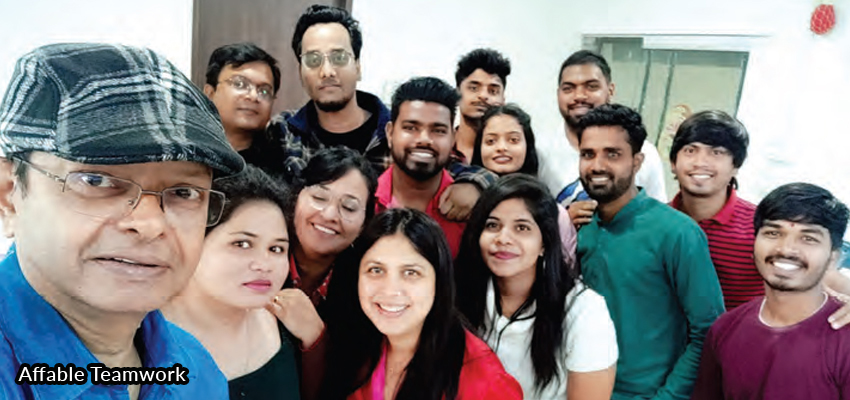Love is a truly potent sentiment that helps build teams and organisations. Many large firms function through respect for authority and designations while younger firms in newer industries adopt an easy air of formality but separate professional and personal life of employees.
Fifteen years ago, I had the privilege of spending 10 weeks at the Harvard Business School re-educating myself in Accounts, Management and Leadership through their phenomenal Advanced Management Program. With a peer group of over one hundred CEOs and senior leadership participants from industry and government from all parts of the world, we would challenge some of the best management faculty members and learn as much from the interactions outside class as we did from the 200 or more cases that brought practical experience and expertise into those hallowed classrooms.
There were many lasting friendships and partnerships made in those 10 weeks, but for me the most precious was an emotional and professional bonding with David Garvin, to my mind the best Professor of Leadership that has walked this planet. We stayed in touch after the program ended and had the privilege of hosting him when he visited India with his lovely wife Lynn. One evening a couple of years later, we were having dinner in Boston and he was genuinely pleased at the great progress we were making at Zensar Technologies, growing much faster than the industry average and more important, succeeding in our Triple Bottom Line (Profits, People and Planet) approach to holistic and sustainable growth of the company. And at the end of dinner, he asked “If there is one word you would use to describe the main reason for success, what would that be, Ganesh?” and almost spontaneously I responded “Love”.
While a lesser teacher would have regarded “Love” as just a flippant response, David said he had never heard that in 40 years of teaching and working with management teams and would like to spend time at our campus to research it. Sure enough, eight weeks later, Prof Garvin and a colleague Retina were at our campus, understanding our growth in the last 10 years, chatting with associates and soaking in the atmosphere. And at the end of it he wrote an absolutely wonderful case “Vision Communities at Zensar Technologies” which captured the “love” culture and detailed the many innovative leadership and associate relationship management techniques that made Zensar a truly unique organisations with an employee retention touching 95 percent and critical talent attrition less than two percent. And I had the privilege of co-teaching the case with him many times. In each class, it would take less than an hour for fairly cynical second year students to move their thinking on leadership tools from just profitability, return on capital and market share to genuine employee engagement and love and trust to win in any industry.
Today, a decade later and five years into my entrepreneurial stints beyond Zensar, I remain firmly wedded to the idea of love as a truly potent sentiment that helps build teams and organisations. Many large firms function through respect for authority and designations while younger firms in newer industries adopt an easy air of formality but in their pursuit of work-life balance, try to keep the personal side of employee relationships distinctly separate from the professional side. In my leadership induction at NIIT and my 25 year CEO experience at APTECH and Zensar, I managed to learn and practice genuine affection for colleagues and teams, which enabled a truly connected organisation to emerge. In both companies, we paid well below the 60th percentile but rarely lost key people because they never felt the need to look elsewhere to find recognition and motivation in the workplace.
The Harvard Business Review wrote an article later that sparked a debate on one of our unique methods – the Associate Relations function, where for every 200 associates, a dedicated human resource person was available, to work with managers and ensure that even the smallest grievance, concern or suggestion of every member of the team was immediately sensed and responded to. In fact at Zensar, our concern that the love culture could dissipate as we grew from 4000 to 8300 people between 2011 and 2015 led us to launch worldwide programs on connectedness, development action planning and feedbacks for manager everywhere and a new initiative called “Jugnu” which enabled every associate in the organisation to discover the inner fire that made them glow and find linkages to the aspirational fires that were building the organisation. Today, in the organisations we run under the umbrellas of 5F World, Global Talent Track and Lighthouse Communities, the same focus on agency building in young employees and letting the mind and heart flow through the work everybody does is enabling us to blaze new trails and retain our people far better than peers in the industry segments we are part of.
It was a personal tragedy for me when Professor David Garvin succumbed to cancer a few years ago and when my wife and I flew to Boston to spend a day with his wife Lynn, we all realised that it is not just wonderful Professors like him but also partnerships between thoughtful academicians and innovative leadership practitioners that will make the corporate world and the social sector a truly rewarding journey for so many millions who seek to work with us. Love is actually the best way!
